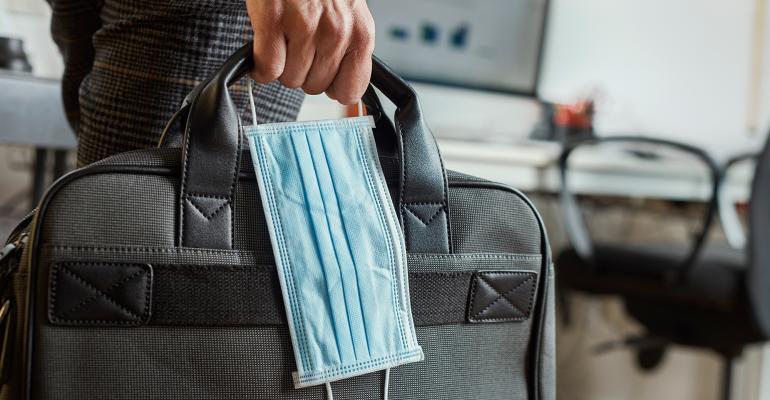Every morning, Jonathan Cohen drives to work through the empty streets of Los Angeles.
“It’s a whole new experience… traffic has been wonderful,” says Cohen, chief operating officer of Universe Holdings, an owner and operator of apartment buildings with dozens of properties in Southern California, headquartered in Los Angeles.
Most offices in the city are still closed to fight the spread of the novel coronavirus. But more than two-thirds of the people who used to work at Universal’s main office in a high-rise tower in the Century City neighborhood have been back at their desks on any given workday since early this summer.
A growing number of companies that own and manage apartments are bringing employees back to work to their main offices and applying best practices companies have learned from throughout the crisis. Some—like Universal—moved faster than others. However, all of these firms pay for extra rounds of cleaning and disinfection.
Real estate companies in general have been at the leading edge of returning workforces to office buildings. For example, JLL reopened about 75 of its U.S. offices, including its headquarters at Chicago’s Aon Center in July.
As they are bringing more employees on site, these firms are requiring face coverings and have put more distance between workstations to help keep everyone safe. A few have also considered renovations that could improve air quality in offices.
Some of the employees, some of the time
The first of Universal’s staff to return to its headquarters were members of its accounting department, who came back to cut paper checks they couldn’t print out at home. Other employees followed, splitting their time between working from home and Universal’s offices.
Other real estate firms are also asking their employees to mix working from home with coming into the office.
“We have about 50 percent of our employees at our corporate offices each day," says Patrick M. Appleby, president of WinnResidential, an owner and manager of affordable apartment properties, headquartered in Boston. Many of Winn’s employees work three days in the office and two days at home. Supervisors have also been able to establish staggered arrival times as employees come to work every morning to lower the level of crowding even more.
Many large apartment companies are assessing the risk of disease in each area of the country where they do business as they decide to reopen an office and how many employees should return.
“Currently, our headquarters remains closed in Los Angeles, as the city remains on the watchlist,” says Dr. Eryn Mack, director of culture and organizational effectiveness for TruAmerica Multifamily. At the same time, TruAmerica has reopened its regional office in Arlington, Va., where the level of new infection is lower. That office is operating at under 30 percent of its physical capacity, with many employees still working from home. The firm’s offices in states like Washington and Florida are still closed.
Avison Young reopened its office in New York City on July 6. “As New York State carefully monitors the number of cases in our area, we follow that as our guideline,” says Kirsten Beck, vice president and principal in charge of project management for the firm’s New York office.
Real estate companies including Avison Young are also giving their dealmakers as much latitude as they can to decide for themselves whether to work from home or in the office.
“We have made it [our offices] available as a resource for our employees who want to work in the office,” says Rick Anderson, director of human resources for Marcus & Millichap. “Those who prefer to work remotely are doing so.”
Bring your mask
When apartment companies decide to reopen their offices, each keeps their employees as safe as possible based on the latest understanding on how people become infected with the coronavirus.
“The Center of Disease Control has published that COVID -19 is thought to spread mainly from person to person, mainly through respiratory droplets produced when an infected person coughs, sneezes, or talks,” says TruAmerica’s Dr. Mack.
With that in mind, companies ranging from Universal, which reopened quickly, to TruAmerica, which has been more cautious, all require employees to wear masks that can help filter these droplets.
“Our team members are required to wear a mask or face covering when they are moving throughout the office,” says WinnResidential’s Appleby. “Requiring masks was one of the first decisions we made.”
All of the companies interviewed for this story also set up a cleaning program to disinfect office spaces, killing any viral particles that may have settled out of the air or been smeared onto commonly handled surfaces.
Many firms also make sure their employees have access to as many cleaning supplies and disinfectant as they want. “You can clean your desk five times a day,” says Cohen.
“Each office space has a disinfecting kit which consist of a hand-held ultraviolet wand for electronics and disinfecting wipes for surfaces and knobs,” says TruAmerica’s Dr. Mack.
Some firms are also planning renovations that could make it more difficult to catch the coronavirus. For example, Universal is planning plexiglass partitions that would add to the height of cubical dividers. Universal has also considered adding extra air filters that meet the MERV-13 standard that can capture viral particles.
Apartment companies may also take some useful ideas from medical office buildings, which are designed to receive patients who might be infected with coronavirus without spreading the disease. For example, coronavirus tend to break apart when they land on copper surfaces , so some managers of medical offices have applied copper foils to surfaces like doorknobs and elevator buttons.
All of these apartment companies have taken pains to include employees in the discussions of how they reopen.
“The biggest challenges involved making decisions that impact the entire workforce knowing that each colleague and their own personal situation is different,” says TruAmerica’s Mack.





